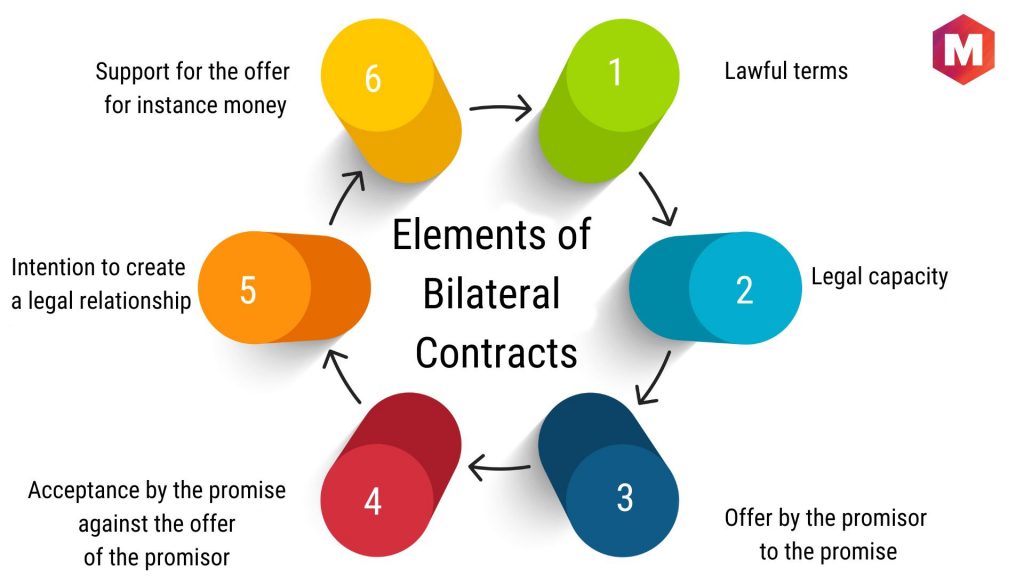A bilateral contract is a type of legally binding agreement between two parties. The contract can be either oral or written. It differs from a unilateral contract where only one party is legally bound, and the other may go away without liability. Other forms of agreements are the multilateral contracts, but we will discuss them in another article.
As stated earlier bilateral contracts are divided into written and oral form. Bilateral contractual obligations can take on many forms, and it doesn’t matter whether it’s for their creation or for their enforcement points.
Table of Contents
What is a Bilateral Contract?
A bilateral contract is an agreement between two or more parties that creates a legal obligation on both sides. It’s called “bilateral” because it involves at least two parties, and it’s called a “contract” because it creates an enforceable obligation between those two parties.
The elements of a bilateral contract are: (1) offer and acceptance; (2) consideration; and (3) legal purpose or object.
A bilateral contract is typically enforced by courts through specific performance, where the court orders one party to perform their duties under the contract, or damages for breach of contract, where the court awards money to second party to make up for damages caused by the breach.
Understanding of Bilateral Contract
A bilateral contract is considered a side deal during a multinational trade agreement. Here both the concerned parties are no doubt involved in general agreement and negotiation but might make a separate bilateral contract that has relevance only to their mutual exchange and shared interest.
A bilateral contract is clear, binding, and legally enforceable. The sales agreement is an example of a bilateral contract where one party offers to sell something and the other payback in cash for that particular product.
In this sense, most of the transactions that occur during our daily life are a type of bilateral agreement, although they are not binding because we have not entered into a legal contract.
Business contracts are bilateral by nature because they offer a specific product or service in exchange for the stipulated amount of money as financial compensation.
A business entity enters into a bilateral agreement with its suppliers and even its employees as an employment contract is also treated as a bilateral contract because the organization is promising to pay the employee a certain wage for executing specified tasks.
Elements of Bilateral Contracts
A bilateral contract is a type of legal agreement between two parties, where one party offers to do something for the other party in exchange for something else. For example, when you buy a car, the seller makes an offer to sell you the car and you accept that offer by paying money in exchange for the car.
A bilateral contract has three elements:
1. Lawful terms
Both parties must agree on terms that are legal and enforceable by an attorney or law firm. These could include details like what kind of car will be sold and how much it will cost.
2. Legal capacity
Both parties must be of sound mind in order to enter into an agreement with each other. This means they can understand what they’re doing and make decisions about it without being influenced by someone else or someone’s judgment about what’s good for them (like their parents).
3. Offer by the promisor to the promise
This involves one party making an offer to another party who accepts that offer by making a promise back to them (for example, saying “I’ll take your offer”).
4. Acceptance by the promise against the offer of the promisor
The contracting parties must agree on what the legal services they are going to provide each other and then make an agreement to fulfill their promises.
5. Intention to create a legal relationship
This means that both parties have agreed to make legal documents to create a legal relationship between themselves and have agreed on the terms of this relationship.
6. Support for the offer for instance money
There must be a consideration from one party in order for there to be an enforceable contract.
Difference Between Unilateral and Bilateral Contracts
Bilateral contracts are two-way, or mutual, agreements between two parties. A unilateral contract is an agreement in which one party makes a promise and the other party has no obligation to keep their end of the bargain.
In a bilateral contract, both parties must uphold their responsibilities in order to be held legally accountable. While unilateral contracts involve, only one party needs to fulfill their part of the agreement.
For example: If you hire someone to perform work for you, they have an obligation to do so under a bilateral contract. But if you buy something from someone else, they don’t have any obligation to you—you’re just purchasing it from them and they’re letting go of it.
Another difference between bilateral and unilateral contracts is that bilateral contracts are usually more complicated than unilateral ones because they require each party to be responsible for their own actions. Unilateral contracts are much simpler; one person is responsible for fulfilling their end of the bargain and the other person doesn’t have any obligations besides paying for what was promised.
Examples of a Bilateral Contract
There are many bilateral contract examples that happen in our daily life 24*7, but these are not legally, binding agreements until and unless you sign a legal contract.
Whenever we are ordering a meal, buying a book from a store, purchasing groceries from the supermarket or even visiting the doctor can be considered a type of bilateral agreement as one is offering value to another for money.
Although these are considered bilateral agreements they are not a bilateral contract because we have not signed an agreement with the other party and if someone like the owner of the bookstore refuses to sell us a book we cannot do anything about it legally. Cases, where the bilateral contract is binding, are-
Harry agrees into a contractual agreement with Tom where he will sell his car to Tom for an amount of 5000 dollars. As soon as Tom gets the delivery, he pays Harry the stipulated sum. This type of contract, where both have promised to offer something to each other, is called a bilateral contract.
Peter agrees to buy the house from Jack at an amount of 20,000 dollars. They enter into a contract and Peter pays the amount when he gets the possession of the house. This was a bilateral contract, but what happens when Peter does not get the possession of the house.
Jack had decided to sell the house because he was being transferred to another city as part of his job. At the last minute, his transfer orders were canceled, and he was asked to handle the department in the present place only.
He refused to sell the house now to Peter, who considers this situation as a breach of contract. As both the parties involved had entered into a legally binding contract, Peter had the right to take the matter to court and sue Jack for breach of contract.
Enforcement of Bilateral Contract
In the above example, Peter needs to prove the following-
- A contract exists between both the parties
- The terms of the contract have been broken
- One party has suffered a loss due to the breach of contract
- The party that is being sued is responsible for the loss.
If Jack and Peter had not entered into a contract, then Peter would not have been able to sue Jack for breach of promise. When the agreement is serious, it is advisable to enter into a contract so that one party can hold the other one accountable if the condition of mutual agreement is not met.
Liked this post? Check out the complete series on Communication



